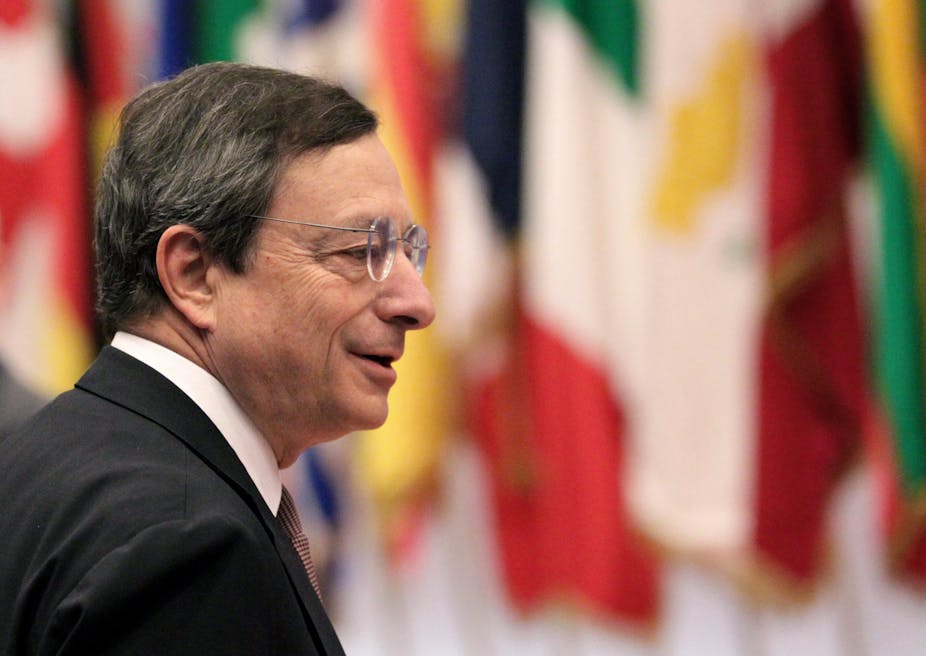Last week was one of mixed fortunes for the Eurozone. The week began badly with news that Italy’s Prime Minister Mario Monti was resigning due to Silvio Berlusconi’s withdrawal of parliamentary support for the technical government, which provoked concerns from financial markets about the Eurozone bond spread and the rise of interest rates for government loans.
But there was also some positive news. The 27 finance ministers in the Eurozone agreed to establish the Single Supervisory Mechanism (SSM) to oversee lenders across the Eurozone under the supervisory control of the European Central Bank (ECB). Clearly, this move is aimed at monitoring lending practices, banking defaults and winding down bankrupt banks. It is seen as a major first step towards a stable economic and monetary union; a union that EU leaders hope will ring-fence banks in trouble to prevent future crises. It is also one of the most significant steps towards financial integration since the creation of the single currency in 1998. The optimism over this agreement moved even the normally conservative Financial Times, which summarised the agreement by stating: “They may not yet appreciate the full reach of the constitutional changes they have set in motion.”
Since 2010, the Eurozone crisis has been punctuated by Ecofin ministerial meetings, bilateral, trilateral and quadrilateral consultations, European summits and crisis gatherings. However, these meetings yielded few effective decisions. Surprisingly, one of the few institutions which has acted with firmness and speed has been the European Central Bank, especially since Mario Draghi took over in November 2011. Different from the more pedestrian and predictable former ECB chief, Jean-Claude Trichet, Draghi has been more audacious and decisive and what some observers call “the game changer”. His July 2012 statement, which said he would do “whatever it takes” within his mandate to save the euro, is one step closer.
After months of negotiations and division — primarily between France and Germany — finance ministers agreed that the European Central Bank would acquire direct supervision of up to 200 Eurozone lenders from early 2014. The measure would mean that governments would surrender control over many national banks. The new provision will see the ECB entrusted with managing the supervisory system in tandem with the London-based European Banking Authority, which covers all 27 EU states and national supervisors. This definition covers between 150 and 200 banks, but leaves most of Germany’s retail banking sector – and its politically powerful network of savings banks – under the ambit of the German national authorities.
Every Eurozone country will have at least three banks directly supervised from Frankfurt. Moreover, from March 2014, banks with assets worth more than 30 billion euros ($A37.4 billion) or equal to 20% of a state’s economic output will come under the ECB’s remit. It will allow Eurozone banks to be recapitalised directly, rather than through governments, so as to avoid adding to their growing debt burden.
According to the Financial Times, “the supervision plan is the first – and probably the easiest – step towards a Eurozone banking union designed to shore up confidence, resuscitate cross-border bank lending and bring down painfully high borrowing costs for banks in peripheral Eurozone countries”.
The ECB will have the right to intervene in cases involving smaller banks, but it is expected that national supervisors will have the main responsibility in this category.
While it might be too early to tell, there is much in this agreement, even if only the broadest contours are clear. There is also uncertainty on the members outside the banking union and the European Banking Authority’s double majority rule, which will need to be revisited. Even if the deal on supervision sticks, it still leaves open the much harder issue of supranational power to shut down or break up bankrupt banks.
That such a serious step towards completing the euro’s infrastructure could be taken without alienating nations on the political periphery of the European project bodes well for the safety of the single market. While there is much that can wrong in any first step, too little has be done to set things right. The Eurozone crisis has been predominantly defined by lack of action and by sovereignty sanctuaries, of which banking has been one. The creation of a single banking union is one of the few instances where the EU has defied both of these weaknesses and acted decisively.

